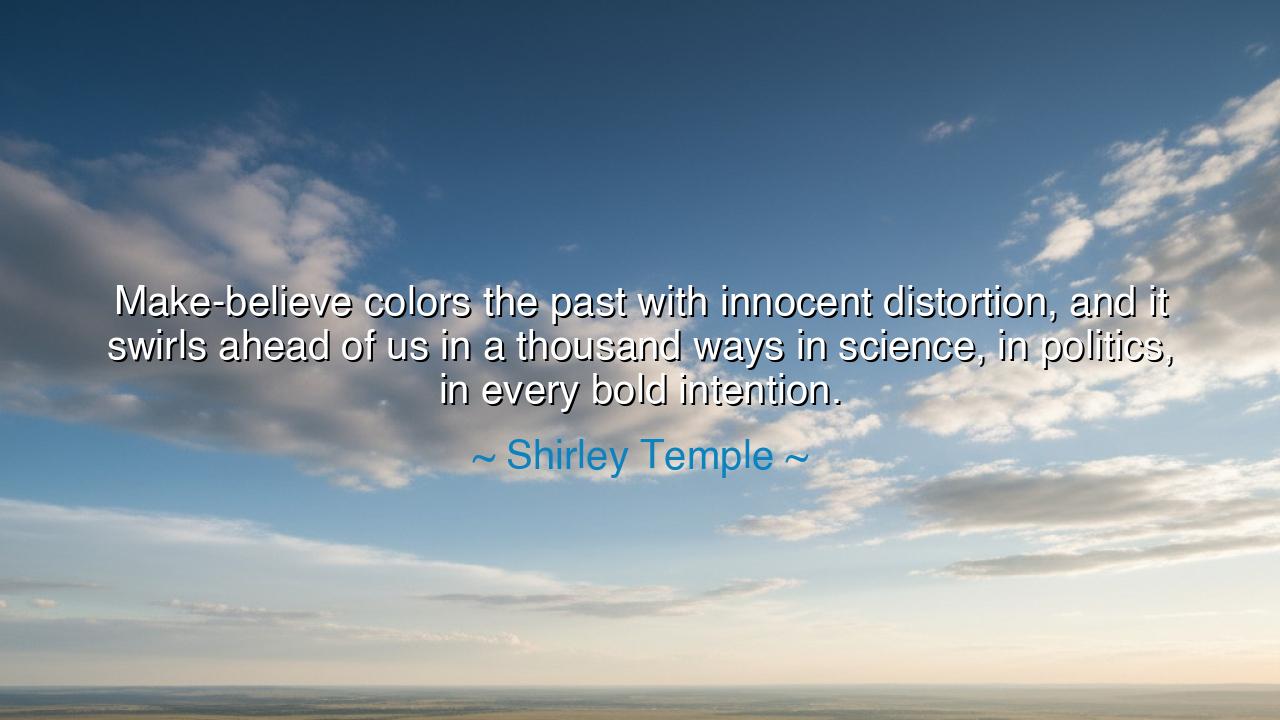
Make-believe colors the past with innocent distortion, and it
Make-believe colors the past with innocent distortion, and it swirls ahead of us in a thousand ways in science, in politics, in every bold intention.






Listen, O children of wisdom, for I bring you the words of Shirley Temple, a figure whose innocence and charm captured the hearts of many. “Make-believe colors the past with innocent distortion, and it swirls ahead of us in a thousand ways in science, in politics, in every bold intention.” In this reflection, Temple speaks to the subtle yet powerful nature of imagination and illusion in shaping our perceptions of the world. She reminds us that while make-believe has the power to create beauty and hope, it can also distort the truth, coloring our understanding of history, science, and even the intentions that guide our actions.
In the ancient days, the great philosophers of Greece often spoke of the truth—not as something to be assumed or taken for granted, but as something to be pursued with all the wisdom and rigor one could muster. Plato, in his allegory of the cave, showed how easily the human mind is deceived by shadows and illusions. The prisoners, chained and facing the wall, could see only the distorted shadows cast by objects behind them. For them, those shadows were the truth, even though they were mere reflections of reality. Temple’s words echo this ancient wisdom: make-believe, though it can inspire and elevate, can also trap us in distorted perceptions of the world, blinding us to the truth that lies beyond.
Consider the story of Alexander the Great, whose conquests shaped much of the ancient world. The history of Alexander is often told through the lens of glory and victory, with the heroic narrative of his battles and triumphs coloring his legacy. Yet, the truth of his reign is far more complicated—marked by brutality, ambition, and the destruction of entire civilizations. History, as it is often written, is shaped by the lens through which we view it. The narrative of Alexander’s life, just like the many stories of conquerors, has been distorted by the myths of greatness that have surrounded it. The past, Temple reminds us, is colored by the make-believe of history, often magnified by the intentions of those who write it.
In the realm of science, we see how make-believe can also influence our understanding of the world. Consider the example of alchemy, once seen as the precursor to modern chemistry. Alchemists believed they could turn base metals into gold and create the philosopher’s stone, a magical substance that could grant eternal life. While their work laid the foundation for later scientific discoveries, it was also deeply colored by myth and mysticism. The dreams of the alchemists, though based in a desire for understanding, were clouded by the make-believe of their time. It was only when science began to distance itself from these illusions that it could truly begin to uncover the laws of nature in a more accurate way. Temple’s insight into make-believe in science reminds us that the pursuit of knowledge must be carefully tempered with clarity, for even the greatest discoveries can be clouded by the stories we tell ourselves.
The same distortion is present in the realm of politics. Throughout history, leaders have often used the power of narrative—the telling of stories—to shape public perception and justify their actions. The idea of a heroic leader or a noble cause has been employed time and again to rally nations, even when the reality behind those causes was far less noble. Consider the story of Napoleon Bonaparte, whose rise to power was marked by the creation of a myth—a story of destiny and greatness. In the popular imagination, Napoleon is often portrayed as a military genius who sought to spread liberty, yet his actions were often ruthless, leading to war and destruction across Europe. The make-believe of his legacy has obscured the true cost of his ambitions. Temple’s words warn us that politics, like history, can be colored by the stories we choose to believe, and these stories can distort our understanding of truth.
The lesson here, O children, is to approach the world with both imagination and awareness. Make-believe has its place in shaping dreams, in crafting hope and inspiration, but it must not replace the truth. As you walk through life, be wary of the stories that are told, whether they are stories of the past, of science, or of politics. Recognize that truth is often buried beneath layers of distortion, and the true nature of things can only be revealed through careful examination, through questioning, and through a willingness to look beyond the surface. The narratives that shape our world, while powerful, must be challenged if we are to discover the deeper truths of our existence.
In your own lives, O children, do not simply accept the stories that are handed to you. Seek the truth, not just in what is presented, but in what is hidden beneath the layers of make-believe. Question the narratives that are told to you, whether in history, science, or politics, and always seek the deeper truth. Remember that make-believe can be a force of creativity, but it can also distort the very foundation of reality. Seek to balance the imagination that inspires you with the wisdom that comes from understanding the world as it truly is.
So, O children, as you journey through life, let your hearts be filled with wonder and imagination, but let your minds always remain sharp and clear, seeking the deeper truths that lie beneath the surface of every story. For in doing so, you will uncover not just the facts of the world, but the wisdom that will guide you to a deeper understanding of the mysteries of life.






AAdministratorAdministrator
Welcome, honored guests. Please leave a comment, we will respond soon